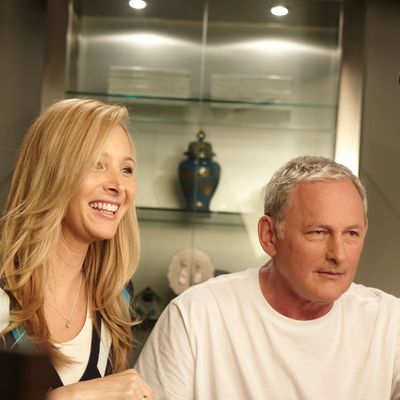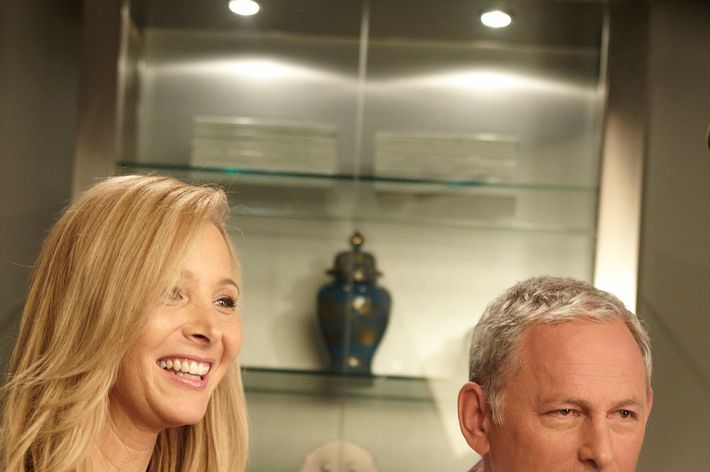

Everything about Showtime’s new series Web Therapy feels made with the Internet in mind — and indeed, it was. The new cable version has collected and expanded three seasons’ worth of Lisa Kudrow’s online series, which focused on the professional misadventures of the epically unqualified Fiona Wallice (Kudrow), a snippy, clueless, and narcissistic therapist who invents a new treatment “modality” (she looks up the definition of the word at the start of the first episode and then proceeds to use it every five seconds) consisting of three-minute web-based therapy sessions. It’s a stupid idea, but it’s just dumb enough to sound like something that could be monetized, which of course Fiona immediately set out to do, unleashing terrible advice on a slew of hard cases. Joined by a revolving cast of impressive guests — including Julia Louis-Dreyfus and Meryl Streep — with whom she communicated entirely via video chat, Kudrow focused on the kind of improvisational humor she does (and clearly loves) best: Call it the comedy of social ineptitude. From its original short attention-span length to the fact that it spoofs a particular kind of narcissism and duplicity that thrives online, the ‘net is Web Therapy’s perfect platform, so it seems slightly counterintuitive of Showtime to pick it up and flesh it out into a premium cable product, complete with a high-toned surrealist credit sequence. That’s what they’ve done, however, and it works pretty well, considering the boundaries of the format, which limit the comic possibilities to stilted conversations, awkward silences, and misunderstandings.
For its expanded, 30-minute form, Kudrow and her co-creators, Don Roos and Dan Bucatinsky, have populated Fiona’s world with actual characters. The segments are integrated into the existing web therapy sessions, providing each episode with the dimensions of a story and the season with a cohesive arc. The wonderfully slick-yet-twitchy Victor Garber plays Fiona’s previously unseen husband Kip, a lawyer from whom she’s been estranged since the honeymoon, and who still doesn’t understand why she left her previous job at the Lachman Brothers financial firm. Lily Tomlin plays her preppy dowager mother, Putsy, who openly hates her and disparages her new line of work. She’s gained an employee — an IT guy named Kamal (30 Rock’s Maulik Pancholy), whose polite tech support she mistakes for innuendo, even after he tries to set her straight — and an ongoing relationship with her old employers, from whom she tries to extort money in order to launch her online service. The only person who seems to like Fiona is Richard (Tim Bagley), a former co-worker with whom she had some kind of thing — the facts are disputed, though he does seem more receptive to her than anyone else in her life, except perhaps for Lachman Brothers’ slutty and dim-witted yet spectacularly passive-aggressive receptionist, Gina Spinks (Jennifer Elise Cox), who is always letting her know what people think of her, even if Fiona can’t hear it.
Web Therapy is the diametrical opposite of the recently cancelled HBO series In Treatment, which Fiona would have found completely unwatchable, not just for its length but for Gabriel Byrne’s portrayal of a therapist as soulful, engaged, and troubled. Fiona’s approach, by contrast, is to be completely dismissive of her patients’ feelings, dreams, and inner lives, and to stay away from treating “oldies and fatties.” Frankly, her primary goal is less to heal than to figure out a way to franchise her idea. It’s a funny idea, but there’s something about Fiona’s stupidity combined with her self-centered arrogance that makes the show hard to take in large doses — maybe because this combination is so prevalent in the real world, where it’s more depressing than funny. Kudrow seems perennially fascinated by stupid, self-deluded characters (like actress-turned-reality-star Valerie Cherish in her 2005 HBO show, The Comeback), who fail to realize that they are objects of ridicule rather than the pillars of respect they believe themselves to be. Yet she doesn’t seem to find that much to like in these figures. The new narrative threads involving Kip and Putsy make Fiona pitiable, but no more engaging than she was before, and the webcam framing device never lets it transcend its original status as an amusing but ultimately forgettable online time-waster. Web Therapy is good in quick viral-sized doses, but binge and you might end up Googling treatments for Internet addiction.
Related: Lisa Kudrow on Web Therapy’s Move to Showtime and The Comeback’s Cancellation

